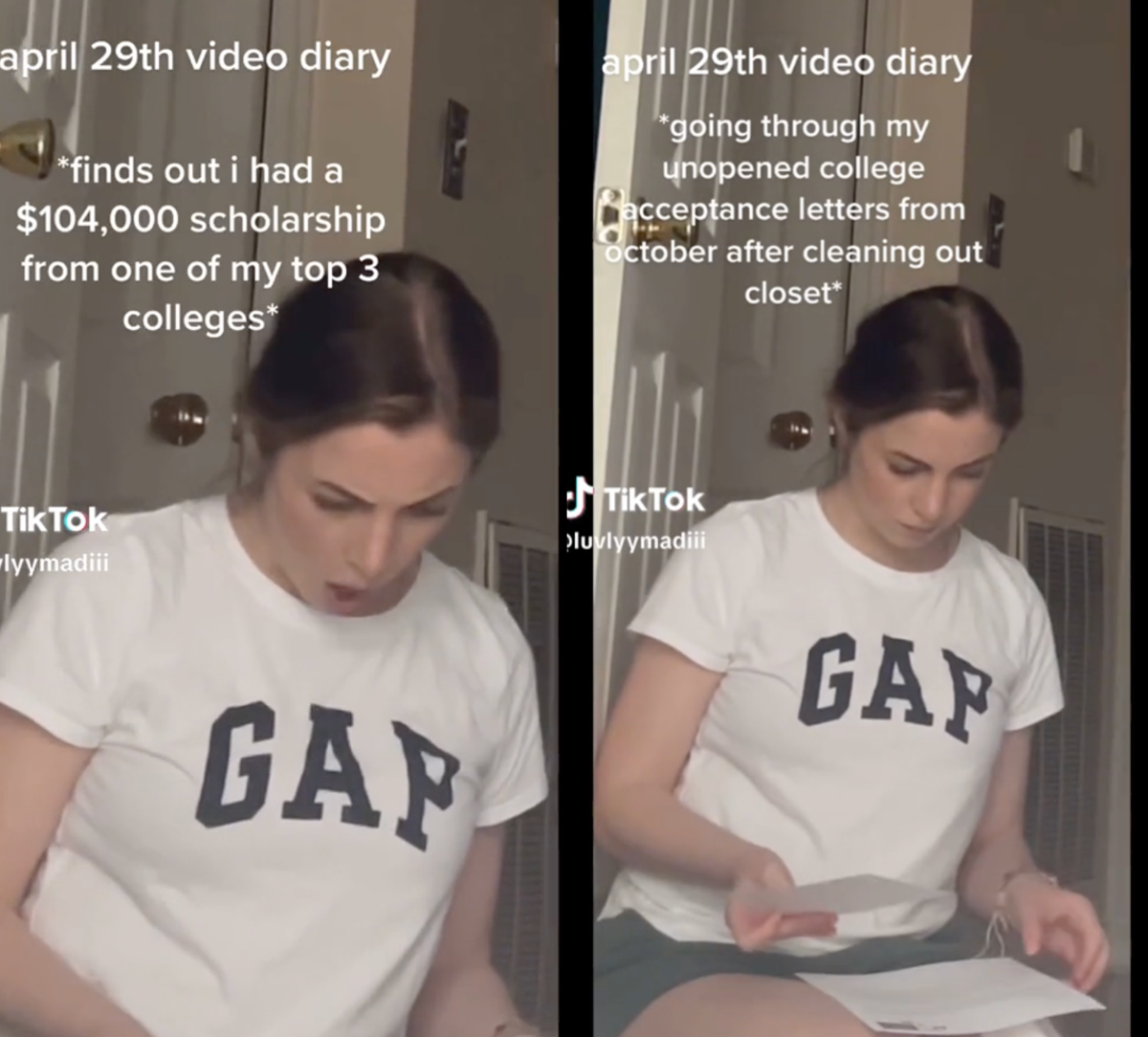This website uses cookies so that we can provide you with the best user experience possible. Cookie information is stored in your browser and performs functions such as recognising you when you return to our website and helping our team to understand which sections of the website you find most interesting and useful.

A woman went viral after she discovered an unopened scholarship letter from one of her top colleges, prompting the school to reach out to her.
Last month, Madi, who goes by the username @luvlyymadiii, shared a clip on TikTok of her video diary for 29 April. As she sat on the floor, she proceeded to go through her mail, before finding an unopened letter from Maryville College, which is based in Tennessee.
“Going through my unopened college acceptance letters from October after cleaning out [the] closet,” she wrote in the text over the clip.
In the footage, Madi proceeded to look at the letter and opened her mouth in shock. She described the offer that she received from the university, writing: “Finds out I had a $104,000 scholarship from one of my top three colleges.”
Madi then looked at the camera, before pointing out her feelings of “shock and anger”. She continued to film herself reading the letter, as she explained why she didn’t initially plan on going to this school.
“Already decided to go to a community college because I thought university would be too much debt. Disappointed I never opened this letter & college decision day is literally Monday,” she wrote, referring to 1 May, which is the date that many high school seniors decide which college they want to attend in the fall.
The 18-second video ended with Madi holding up the letter, as she turned her head to the side and continued to look disappointed. The sound of the footage also included a snippet of the Taylor Swift song “High Infidelity,” from her album Midnights. Madi made a reference to one of the lyrics in the caption, writing: “Do you really want to know where I was April 29th?”
As of 17 May, Madi’s video has more than 2.8m views, with TikTok users in the comments encouraging her to still go to Maryville College.
“Change your decision, it will be worth it!!” one wrote, while another added: “GO. enrollment deposits are NOT binding. Go!!!”
A third agreed: “You opened it a day before decision [day] for a reason. Go and get that uni education w/ the scholarship!! It’ll be worth it!.”
In a follow-up video, Madi revealed that the admissions office at Maryville College had called her, after seeing her viral video. She explained that the university was still offering her the scholarship and wanted her to attend the school.
“Basically, they said that they were going to make my dreams come true,” she said. “They’re going to send me like an official award offer letter to my Gmail. I don’t know how they found me but they did. So, now I’m going to college, and I’m just so excited!”
She went on to explain why she didn’t open the letter in the first place, noting that she had “over 300 letters come in” at the time, and it was “impossible” for her to open every single one. She also pointed out how she had a busy schedule.
“I was still doing a ton of school work, and I had a job,” she said. “So, I just figured I was going to keep all of those letters for my children so that whenever they were in high school, I’d be like: ‘Your mom was a genius, and you should be working like a genius.’”
She concluded the video by expressing how excited she is to be going to Maryville College.
The Independent has contacted Madi and Maryville College for comment.
Meanwhile, this isn’t the first student who has gone viral on TikTok, when sharing some of their experiences. Last month, one university student sparked a debate about expectations in school when she tearfully revealed that her professor gave her a zero on her six-page philosophy essay.
“And so I wrote this entire paper, and all I needed on it was a 17 or 18 per cent to pass the course. The professor gave me a zero,” the college student, Erika Schafrick, explained in her viral clip. “And I’m literally sitting here thinking it was a mistake so I sent him my submission receipt and he was like: ‘No, it’s not a mistake, here’s your feedback.’”
According to Schafrick, her professor claimed in the feedback that what she’d written “misrepresented” the text the class had been assigned. However, she alleged that the work could be “interpreted in so many different ways”.



 Africana55 Radio
Africana55 Radio 
